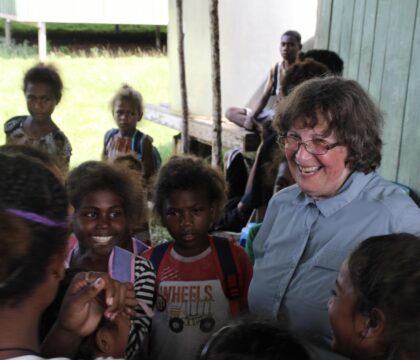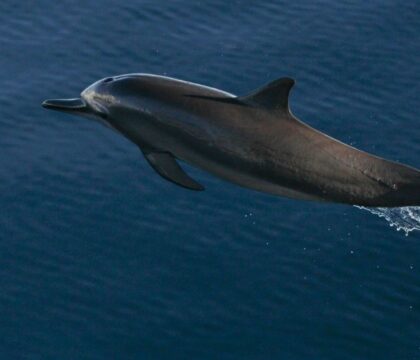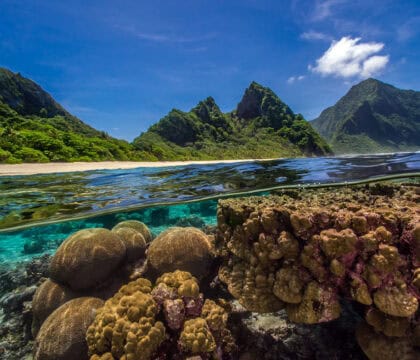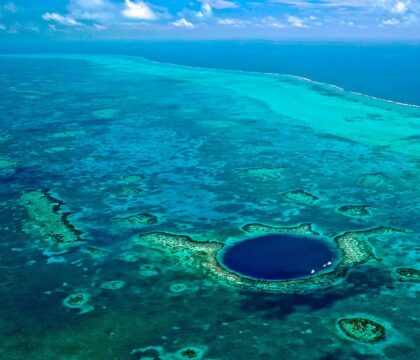July 30, 2024 • Program Updates
In late 2023, Oceanic Society awarded 19 small grants to field-based sea turtle conservation projects in Cabo Verde, Colombia, Costa Rica, Indonesia, Madagascar, Mexico, Nigeria, the Philippines, Solomon Islands, Tanzania, and the United States. Today, we are proud to share an update from each grantee, showcasing their impressive individual and collective accomplishments.
These grants were made as part of our State of the World’s Sea Turtle (SWOT) small grants program, which has provided 160 grants to 125 applicants in more than 57 countries and territories since 2006. For the fifth consecutive year, we partnered with the Association of Zoos and Aquariums (AZA) and its Sea Turtle SAFE (Saving Animals from Extinction) program to make grants supporting the conservation of two of the top global priorities for sea turtle conservation—eastern Pacific leatherbacks and Kemp’s ridley turtles. Those grantees are marked with a (*) on the list below.
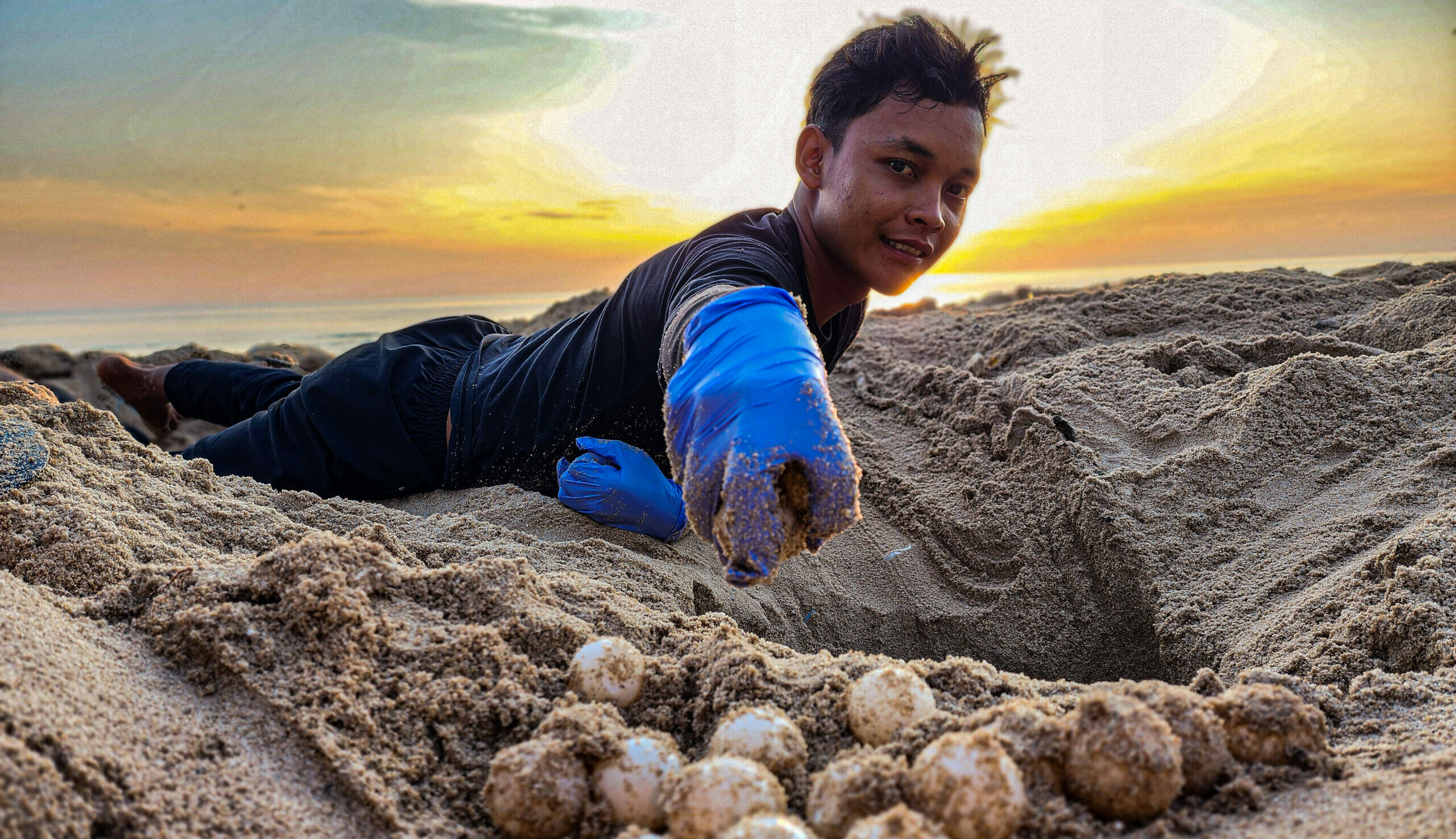
Anambas Foundation rangers protect a sea turtle nest by relocating it to a safer spot in Anambas marine protected area in Indonesia.
Grantee Accomplishments
Collectively, in 2023-2024 our grantees:
- Monitored and protected 8 beaches in priority populations.
- Protected 486 green, hawksbill, and leatherback nests.
- Released 20,124 hatchlings of which 1,762 were critically endangered east Pacific leatherbacks.
- Held 14 workshops attended by 223 participants.
- Employed 77 community members for conservation initiatives.
- Held 21 environmental education events that reached 3,061 people.
Learn more about the work of each grantee in the following sections.
CURMA – Philippines
CURMA is a nonprofit that uses education to promote sea turtle-friendly behaviors in local communities. Their campaigns have raised local awareness of sea turtles and their importance to the marine environment and ecosystem. Their efforts have resulted in a significant reduction in beach litter and the participation of community members and children in their sea turtle conservation volunteer program.
With their 2023 SWOT Grant, they:
- Piloted environmental education programs in 2 schools, reaching 300 children in communities where sea turtle eggs are collected for consumption
- Held 2 beach cleanups with 200 participants resulting in the collection of 150 lbs of trash
- Reached 7000+ people on Social media
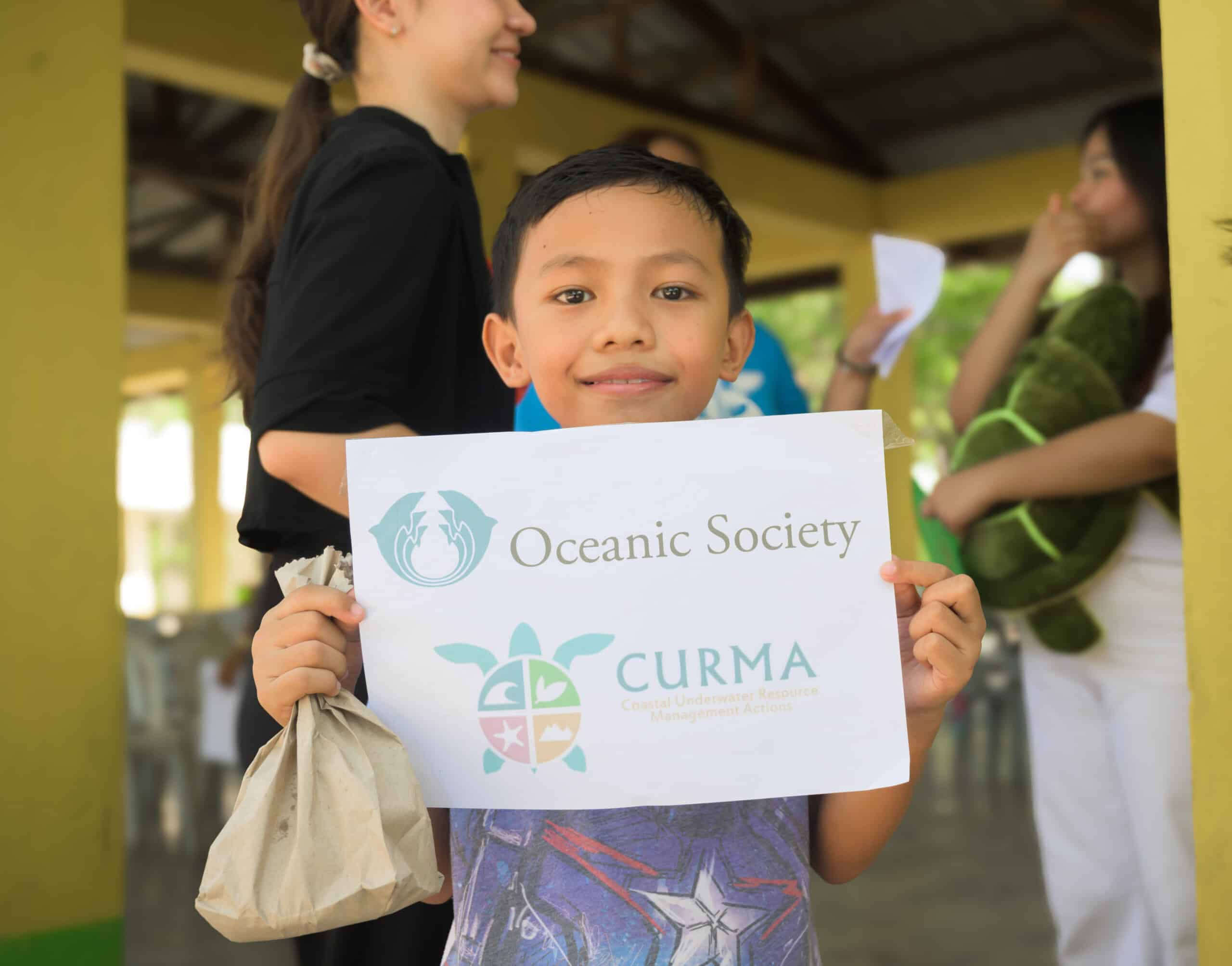
© CURMA
Fundação Tartaruga – Cabo Verde
The Turtle Foundation is a non-profit whose work focuses on developing initiatives in collaboration with local communities to better protect sea turtles and their habitats. The program for which they received a SWOT Grant involved visiting local schools with sea turtle rangers and their “conservation dog” Kelo who demonstrated his tracking skills and inspired kids to help him in his mission to save sea turtles.
With their 2023 SWOT Grant, they:
- Visited 8 primary schools in Boa Vista
- Presented to ~400 children
- Distributed >500 educational flyers
- Sponsored the participation 7 members of their dog and drone patrol team who presented their projects to schools

Conservation patrol dog Kelo visits schools in Boa Vista, Cabo Verde to raise awareness about local sea turtles. © Fundaçao Tartaruga
Safe Earth Foundation – Nigeria
Despite years of successful conservation work by Safe Earth Foundation (SEF), fishing practices continue to impact turtle populations of Akassa, Nigeria. To address this threat, SEF has expanded its outreach program to include local fishers. Their project included training local fishers on best practices for bycaught sea turtles and collecting data that will help researchers understand incidental capture rates.
With their 2023 SWOT Grant, they:
- Held a workshop on best fishing practices attended by 30 participants in 6 coastal communities
- Through a community knowledge-sharing session identified local threats to sea turtles (harvest of nesting females and eggs, entanglement, habitat degradation from erosion, plastics, and lack of law enforcement)
- Conducted an education & outreach campaign that reached 115 community members
- Held a training session on national legislations and international sea turtle conservation protocols for 5 officers of the Nigerian Navy, 8 officers of the Nigerian Professional Hunters and Forest Security, and 6 local Chiefs
Sea Sense – Tanzania
Sea Sense has been researching and protecting the sea turtles that nest in Mafia, Tanzania for over 20 years thanks to their team of Community Conservation Officers– local community members trained in research and beach monitoring protocols. Sea Sense now aims to expand its data collection and understanding to include nearshore sea turtles and their habitats. To this end, Community Conservation Officers will visit Bahari Hai, a Kenya-based sea turtle project and past SWOT Grant recipient, to learn methods for in-water monitoring.
With their 2023 SWOT Grant, they:
- Are sending 5 Conservation Officers to Bhari Hai in Kenya for in-water protocol training
- Monitored 5 turtle nesting beaches in Tanzania
- Protected and documented 198 nests
- Released over 17,000 sea turtle hatchlings
Anambas Foundation – Indonesia
With a total area of 1.2 million ha, Anambas is the second-largest marine protected area (MPA) in Indonesia and is nationally listed as a priority site for sea turtle conservation. To effectively manage and protect sea turtles in the MPA, Anambas Foundation conducts sea turtle monitoring programs and promotes community-based conservation and outreach, thereby creating a holistic and long-term solution to sea turtle population decline in the area.
With their 2023 SWOT Grant, they:
- Held community outreach and discussions attended by 71 villagers across 3 villages
- Recruited 7 rangers who signed a conservation action agreement
- Held workshop (1 in-class day and 2 days in field) attended by 7 rangers and 2 fishers
- Relocated 24,136 eggs from 234 nests (54 of which were hawksbill) and released 1,362 hatchlings
- Tagged 6 turtles and recorded 355 turtle tracks on 3 beaches
- Held a turtle release event attended by 50 people
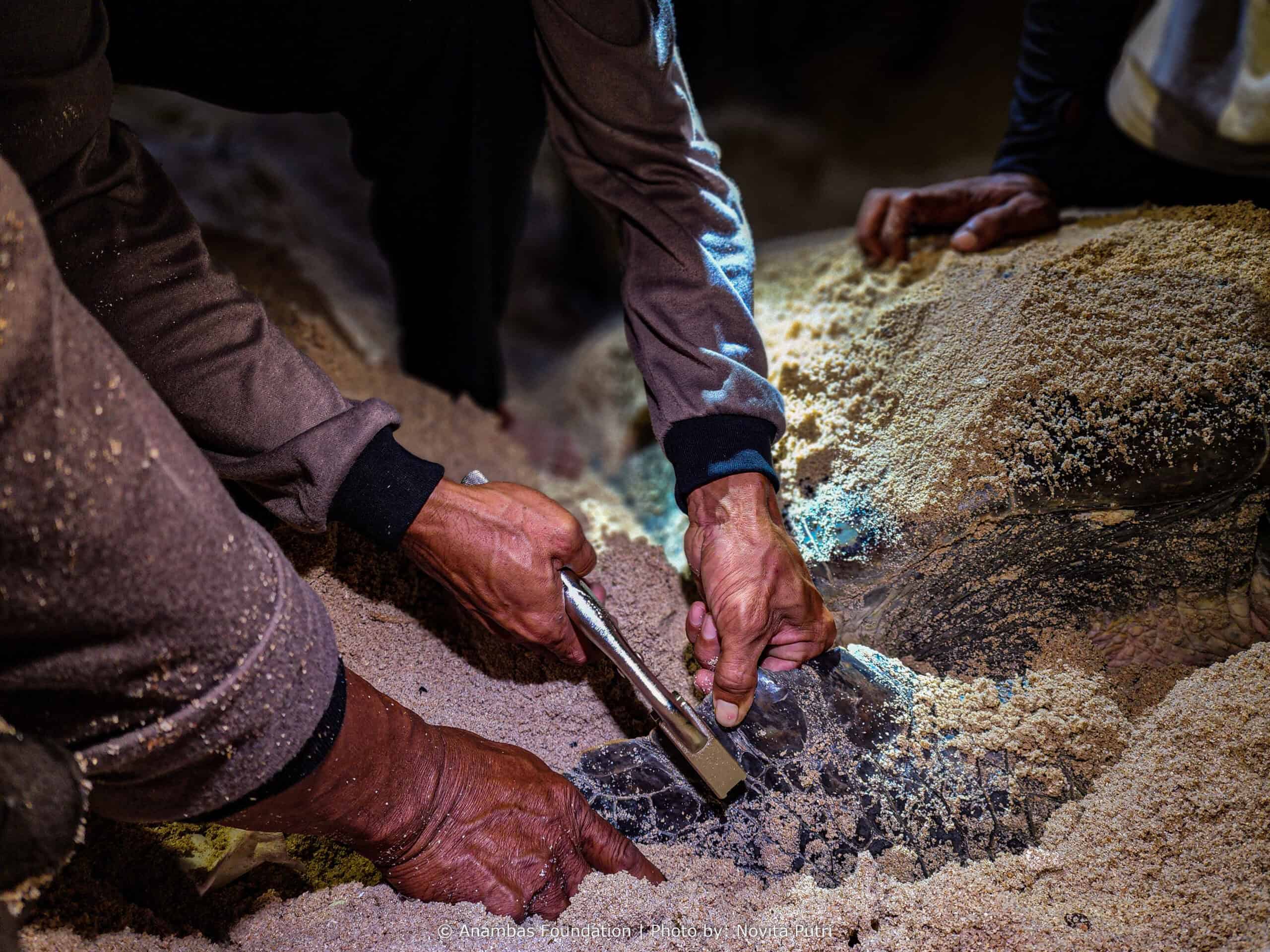
Anambas Foundation trains and employs local community members to work in sea turtle conservation.
Tetepare Descendants Association – Solomon Islands
Before Tetepare Descendents Association (TDA) began its sea turtle monitoring and protection program 20 years ago, nearly all of the leatherback nests laid on the beaches of Tetepare, one of the islands that make up the Solomon Islands, were lost to poachers or the tides. The local rangers (pictured at right) dedicate vast amounts of time and effort to continue monitoring the remote beaches of Tetepare, often camping for a week on beaches only accessible by canoe. SWOT was proud to support TDA’s work for this monitoring season.
With their 2023 SWOT Grant, they are:
- Monitoring isolated nesting beaches in Tetepare, Solomon Islands
- Tagging nesting turtles
- Collecting data on biometrics, population numbers, and hatch success
The National Center for Environmental Research (CNRE) – Madagascar
CNRE is expanding upon initial sea turtle surveys along the coast of the Besalampy region of Madagascar (for which they received a SWOT grant in 2021). Their efforts are determining the population statuses, habitat utilization, nesting sites and densities, and identifying threats to sea turtles in this region. These assessments will inform conservation strategies and raise awareness about threats and potential solutions among local communities.
With their 2023 SWOT Grant, they are:
- Monitoring and identifying sea turtle nesting sites in the Besalampy region of Madagascar
- Estimating sea turtle population numbers in the Besalampy region of Madagascar
* South Carolina Department of Natural Resources (SCDNR) – U.S.A
Interaction with recreational anglers is one of the most common causes of stranding for juvenile Kemp’s ridleys in South Carolina. SCDNR is addressing this issue and raising awareness by posting signage at piers displaying NOAA’s “Recommendations to Reduce Injuries if you Hook or Entangle a Sea Turtle”. They’re also training pier staff through education workshops and presentations on how to deal with a hooked sea turtle.
With their 2023 SWOT Grant, they:
- Placed 55 “What to do if you hook a sea turtle” signs in English and 29 in Spanish
- Held training workshops on how to handle hooked sea turtles at three piers
- Distributed 622 “hooked sea turtle stickers with SCDNR’s phone number to anglers
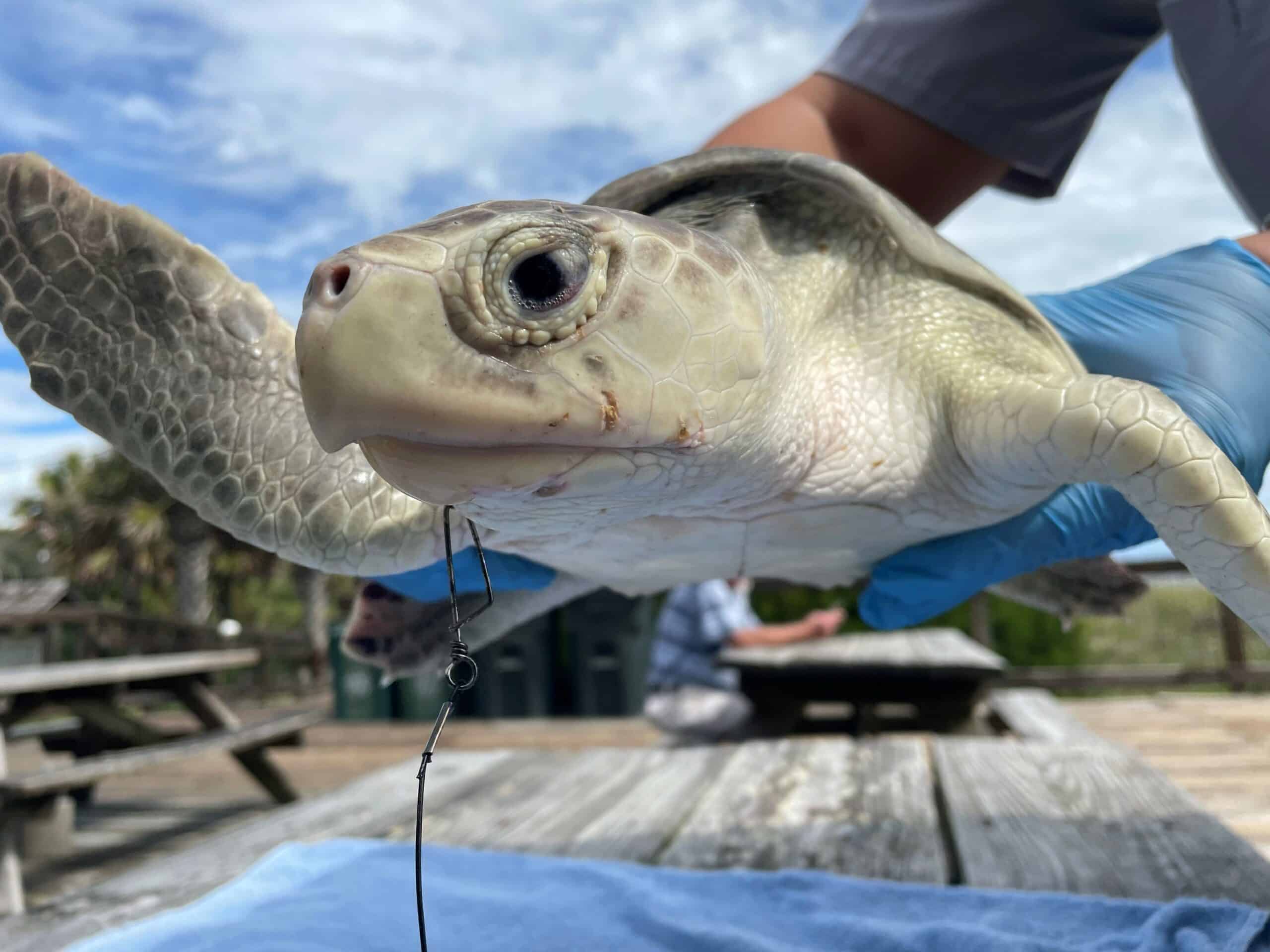
Critically endangered Kemp’s ridleys often get entangled or hooked in fishing gear in South Carolina. © SCDNR
* Elizabeth Labastida Estrada – Mexico
Fibropapillomatosis (FP) is a disease that causes external and internal tumors in sea turtles that can limit vital functions such as feeding, swimming, or breathing. Molecular studies have evaluated whether there are differences in DNA viral sequences between species or populations to understand how the disease affects species or varies between regions, but Elizabeth Labastida Estrada is the first to do so with Kemp’s ridleys in Tamaulipas and Veracruz, Mexico.
With her 2023 SWOT Grant, she:
- Obtained genetic sequences from fifteen tumor samples of Kemp’s ridley females from Mexico
- Generated 15 new sequences of a partial fragment of the DNA polymerase gene of Chelonid alphaherpesvirus 5.
- Will analyze the genetic data obtained from Kemp’s ridley and other sea turtle species to determine the phylogenetic relationships of Chelonid alphaherpesvirus 5
* Gladys Porter Zoo – Mexico
Rancho Nuevo Sanctuary in Tamaulipas, Mexico is the largest nesting beach for critically endangered Kemp’s ridley sea turtles in Mexico. Because of this, most resources and monitoring efforts are concentrated on this beach despite the existence of important secondary nesting beaches nearby. Gladys Porter Zoo will initiate a PIT tagging program at Altamira and Miramar, two important satellite nesting beaches for Kemp’s ridleys near Rancho Nuevo, as part of the Mexico-U.S. Binational Kemp’s Ridley Recovery Program.
With their 2023 SWOT Grant, they are:
- Expanding their PIT tagging program to 2 satellite Kemp’s ridley nesting beaches
* Sea Turtle, Inc. – Texas, U.S.A.
Sea Turtle, Inc. is hosting 3 Conservation Connection Teen STEM Summer Camps that focus on educating high school students in the Rio Grande Valley about the importance of conservation. Each session includes hands-on field activities such as a water quality lab, local marine species identification, microplastic field excursions, and professional development presentations. These are one-day camps offered on 3 select Mondays throughout this summer.
With their 2023 SWOT Grant, they are:
- Holding 3 summer camp sessions
- Conducting a post-attendance survey with participating kids
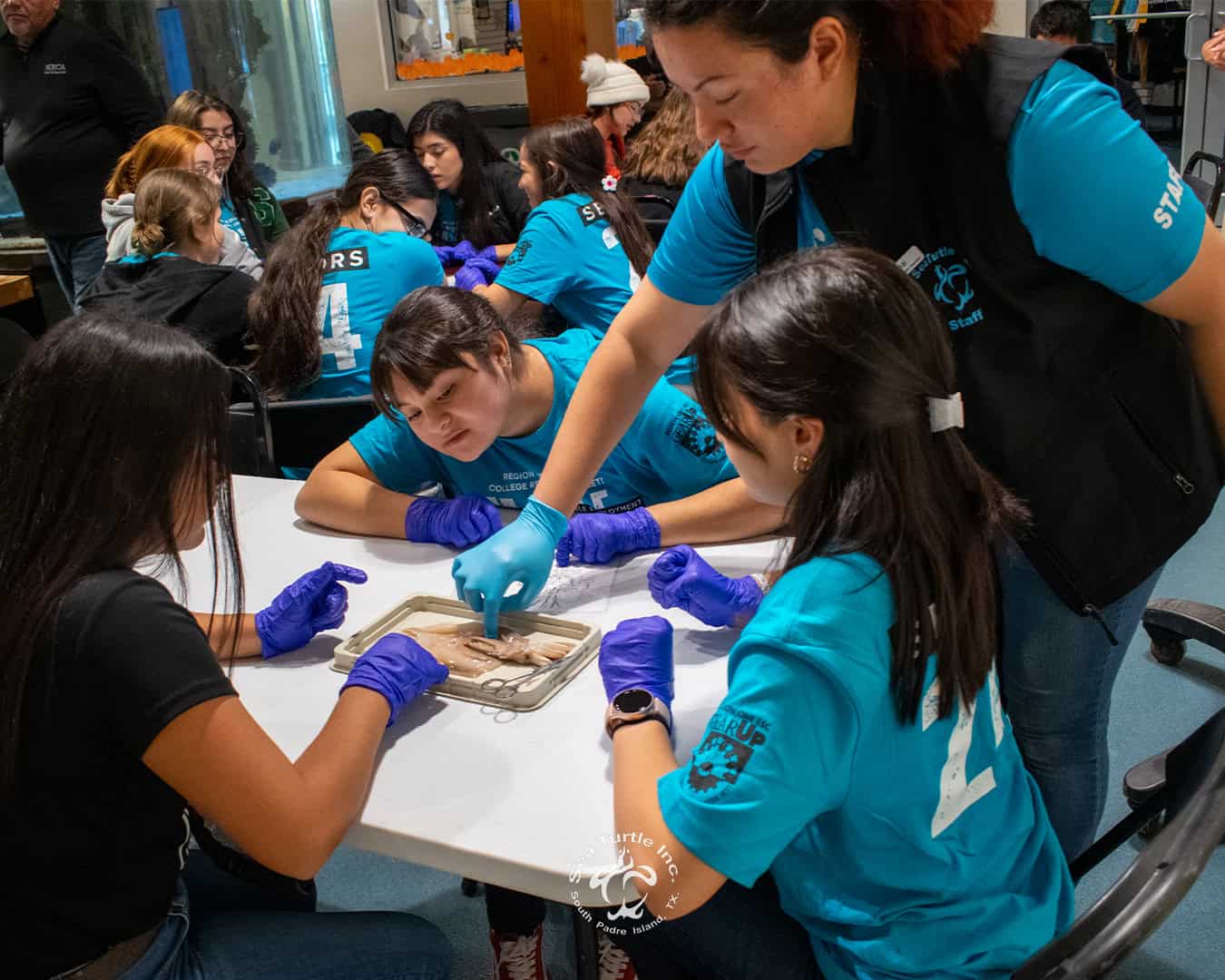
© Sea Turtle, Inc.
* César Paúl Ley-Quiñónez – Mexico
Waste produced through agriculture, mining, urbanization, fisheries, and the oil industry often ends up in coastal environments, affecting the health of ecosystems and sea turtles. These toxic contaminants pose an under-studied threat to critically endangered Kemp’s ridley turtles that nest in Rancho Nuevo Sanctuary, Tamaulipas, Mexico. To answer questions surrounding this topic, César Paúl Ley-Quiñónez has quantified the concentrations of trace elements and analyzed the possible population health impacts on Kemp’s ridleys nesting in Ranch Nuevo.
With his 2023 SWOT Grant, he:
- Collected 68 blood samples of nesting sea turtles during 4 “arribadas”
- Analyzed the blood samples for health parameters (ongoing).
- Is writing two papers on the results obtained from the research
* Centro ECOMAR-UAGro – Mexico
Centro ECOMAR-UAGro works in Guerrero, Mexico to protect, conserve, and research East Pacific leatherbacks. They are now pioneering a program involving local fishermen to raise awareness of the ecological importance of sea turtles in fisheries. By holding beach cleanups, workshops, and sea turtle nest monitoring with fishers and the community, they are also fostering a connection between people and turtles in hopes of reducing the illegal consumption of sea turtle eggs and meat.
With their 2023 SWOT Grant, they:
- Held 5 environmental education workshops in 2 different communities on leatherbacks and fisheries attended by 85 community members.
- Protected 25 leatherback nests
- Released 861 hatchling leatherbacks
* KUEMAR – Costa Rica
Playa Nombre de Jesus and three nearby beaches have become important secondary nesting sites for Eastern Pacific leatherback sea turtles and main nesting beaches for Pacific Green turtles of Costa Rica. The nesting sea turtles attract many tourists and tour operators that KUEMAR set out to educate on best practices for responsibly observing turtles.
With their 2023 SWOT Grant, they:
- Designed and distributed 3 infographics on responsible turtle observations that were distributed to 15 hotels and local tour guides
- Placed 2 signs on the beach with best-practice guidelines
- Observed 819 visitors to the beach who practiced responsible sea turtle observation behavior
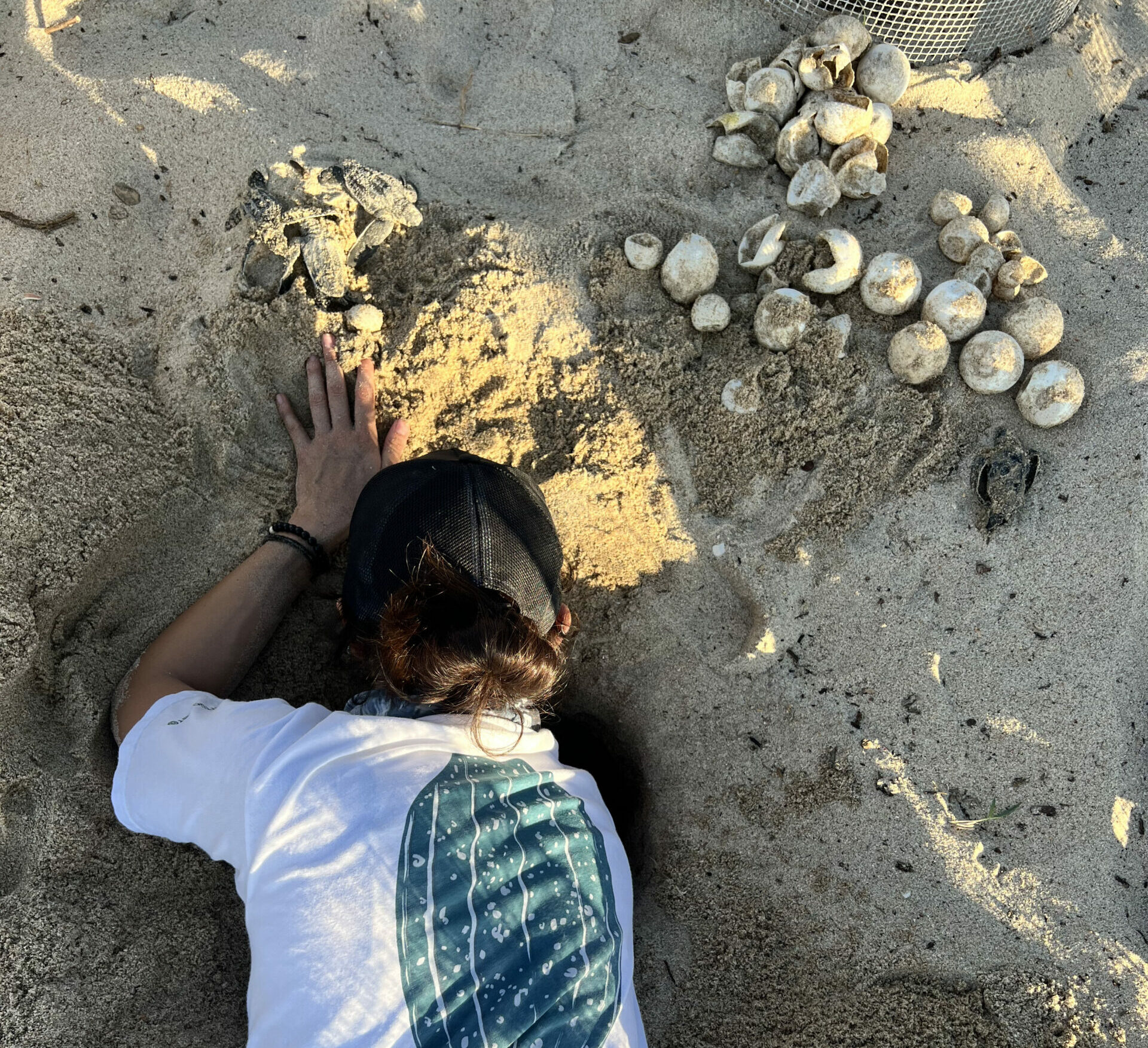
© Mildred Alpizar Quezada is determining the identity and concentrations of trace elements found in the tissue of critically endangered East Pacific leatherback sea turtles.
* Mildred Alpizar Quezada – Mexico
Because sea turtles are part of the last links of the food chain, as they consume prey they bioaccumulate pollutants, or trace elements in their fat stores which can then be passed to hatchlings. These trace elements indicate the health of both the sea turtles and the ecosystems they inhabit. Mildred Alpizar Quezada is determining the concentration of trace elements and morphology of dead East Pacific leatherback hatchlings to better understand this population’s health and the quality of their habitats
With her 2023 SWOT Grant, she:
- Collected 134 tissue samples from dead hatchlings
- Will analyze each sample to determine if trace elements exist and if so what they are
* Universidad Michoacana de San Nicolas de Hidalgo – Mexico
The Universidad Michoacana research determined the operational sex ratio (the ratio of sexually reproductive males to females) of East Pacific leatherbacks that nest in Mexiquillo, Mexico. Knowing the operational sex ratio and temperature in the incubation environment of leatherback nests in Mexiquillo determines whether hatchery operations produce biased hatchling sex ratios and how and when to use shading to balance ratios and prevent lethal incubation temperatures.
With their 2023 SWOT Grant, they:
- Protected 29 leatherback nests that produced 901 hatchlings
- Employed 32 community members to the conservation project
- Placed dataloggers that measure temperature during incubation in 8 leatherback nests
- Determined that the operational sex ratio was 52.0 % males and 47.9 % females, suggesting a successful hatchery
* JUSTSEA – Colombia
Just two ports, Buenaventura, Valle del Cauca, and San Andrés de Tumaco, account for 81% of the total fisheries production in the Colombian Pacific (46.6% and 34.4%, respectively). High fishing activity has also led to high bycatch rates of critically endangered East Pacific leatherbacks. To address this, JUSTSEA held workshops with fishers to train on best practices for handling entangled sea turtles and to hold discussions on turtle-safe fishing techniques.
With their 2023 SWOT Grant, they:
- Held 2 workshops, one at each port.
- Trained 80 fishers in:
- Best practices for handling and releasing incidentally caught turtles
- Modification methods in nets and hooks for bycatch mitigation
- Mechanisms for working with authorities to guarantee sustainable fishing
- How to access new “green” markets through responsible fishing
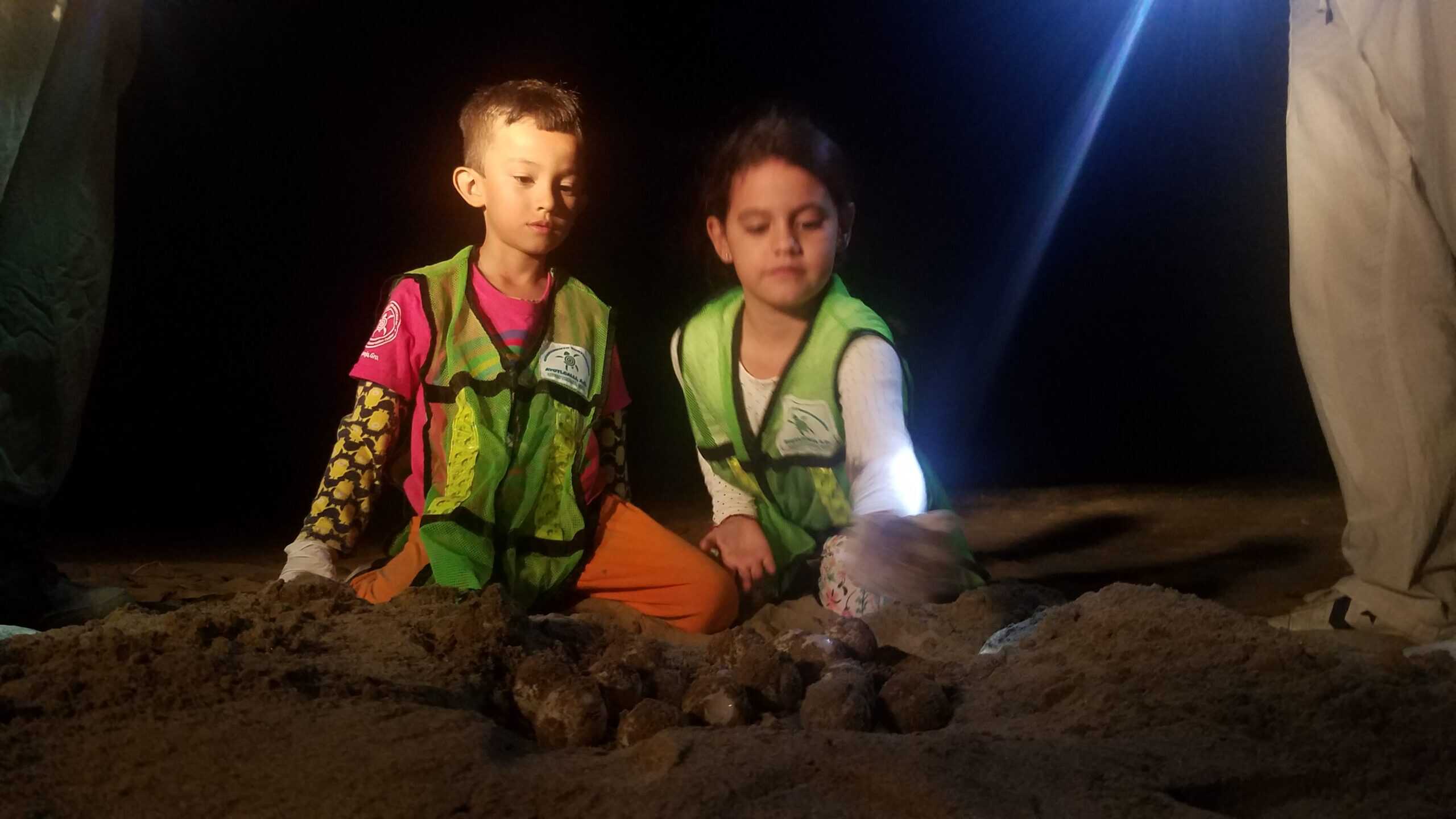
© Campamento Tortuguero Ayotlcalli inspires ocean-friendly behaviors in East Pacific leatherback nesting areas by connecting people with turtles.
* Campamento Tortuguero Ayotlcalli A.C – Mexico
Campamento Tortuguero Ayotlcalli A.C. began operations in 2011 with the goal of protecting and increasing the populations of East Pacific leatherbacks, olive ridleys, and green turtles in Guerrero, Mexico. Now, the project has expanded to involve the members of local communities in conservation efforts and environmental education activities.
With their 2023 SWOT Grant, they:
- Hosted school visits that reached 620 children
- Visited 3 local radio stations,
- Held 2 community presentations in the weekly Saturday Eco market
- Invited families to visit the camp facility, reaching 714 visitors
- Employed 38 camp volunteers
- Engaged 8 fishermen in bycatch outreach campaigns
* GroBios – Mexico
GroBios A.C. conducts important sea turtle works throughout the state of Guerrero, Mexico – an important region for critically endangered nesting East Pacific leatherbacks. With their SWOT grant, they continued to monitor leatherback nesting along Guerrero’s 512 km of coastline, provided training and networking to sea turtle projects in the state, and conducted community outreach activities to promote support for sea turtle conservation in local communities.
With their 2023 SWOT Grant, they are:
- Continuing to protect and monitor nesting sites throughout Guerrero, Mexico
- Determining nest environment factors that lead to higher hatch success
- Uniting and training sea turtle conservation practitioners throughout Guerrero
- Conducting community outreach activities

